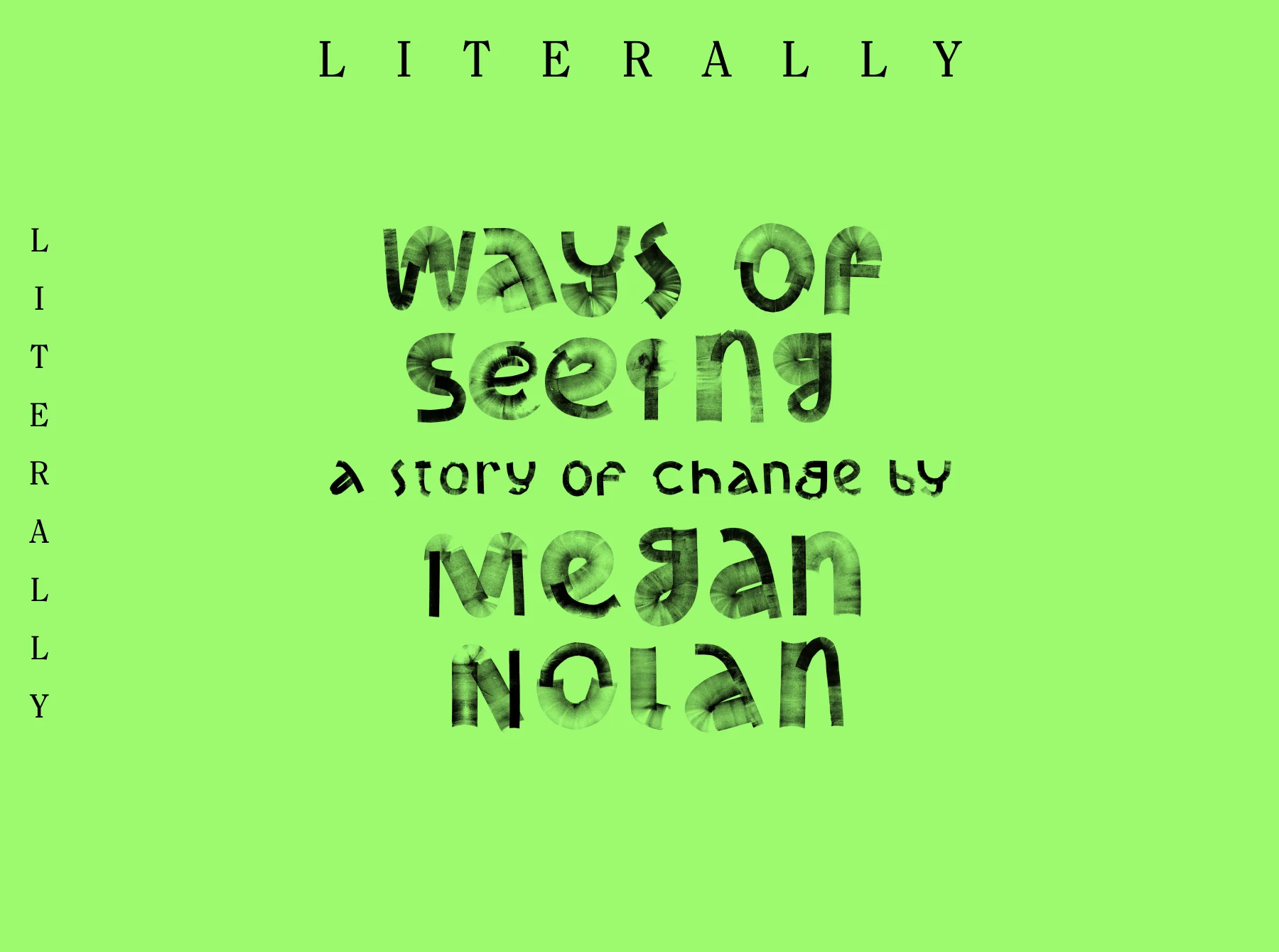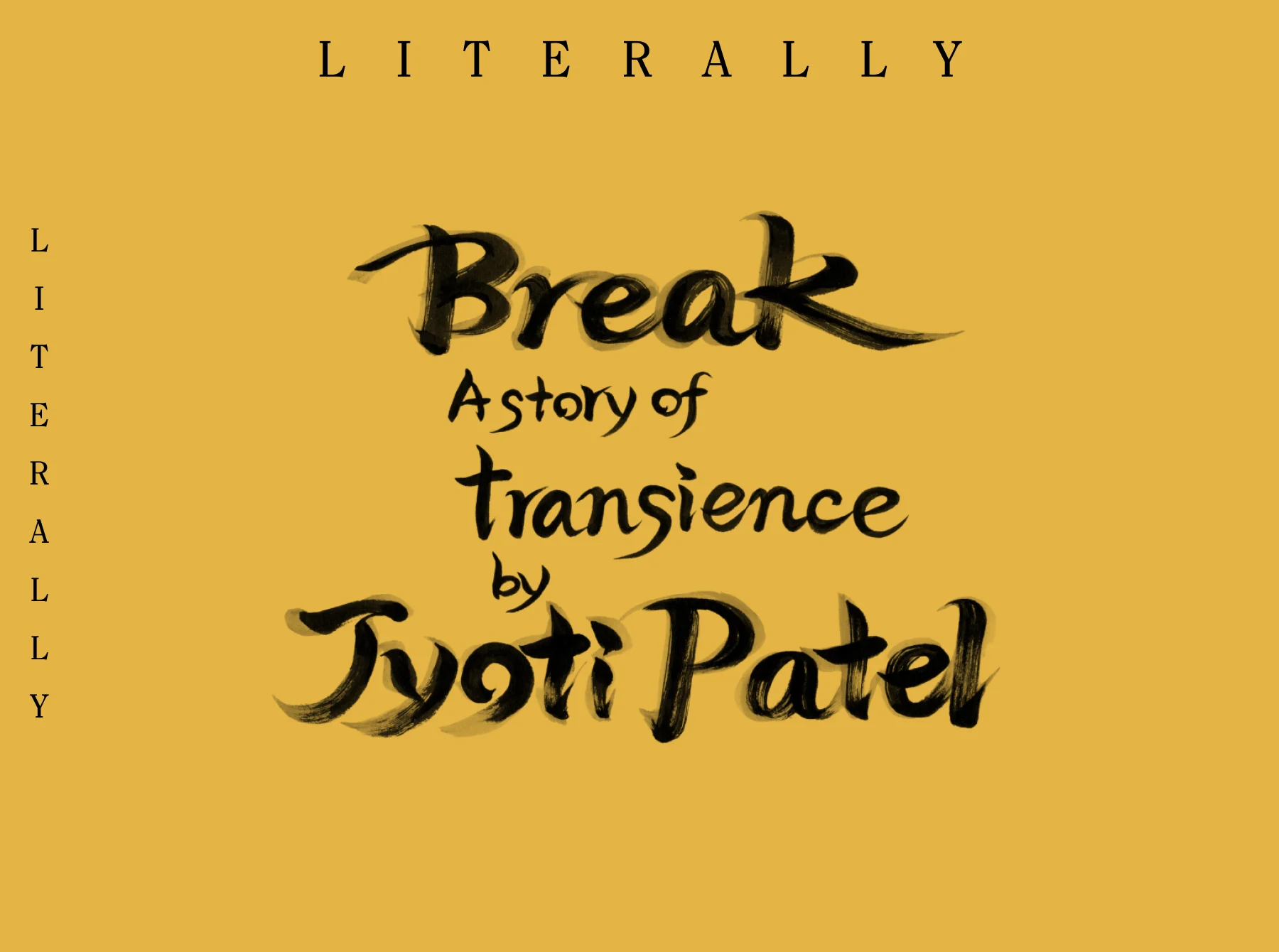

Níkẹ had mastered the art of the painted smile. Non-committal eyes, ever so slightly stretched lips, not one crack in her perspiring, smooth, stucco expression. Her hair was scraped close to her scalp, an unusual thing for a young lady in the late-1970s. Her haircut bared the secrets of her broad head. Truth be told, she looked like a young man in a dress. The ingénue face of a boy might have helped, a few trinkets to distract from the air of mourning. She had small scarifications on each cheek, like those markings given by medicine men for preventing everything from fainting-fits to bad luck. Her large head was mounted on a thickset neck, her stocky frame clothed in ill-fitting, faded, hand-me-downs.

She appeared one day in my maternal grandparents’ home. She and her sister Ìyábọ̀ arrived before us in July that year, for the long school holiday. We never found out for sure if “sister” meant an ambiguously removed relative or village acquaintance, but it was as clear as noon that they weren’t siblings.
Not only did they look nothing alike, but for every reticent movement of Níkẹ’s face and body, Ìyábọ̀ bristled with vim, impossible to injure, seemingly always up in her mood. Ìyábọ̀ came across more like a crucial comrade in discardment. Her contrasting personality felt necessary. As if she was the grace said before sampling Níkẹ’s unpalatableness, the palm oil served with bitter new yam, the happy bonus in the buy-one-get-one-free bargain, the dee to her dum. You sensed that Níkẹ would have been homeless without Ìyábọ̀’s auxiliary cheerfulness, her oddness magnified by the other’s absence.
No introductions were made, all we knew was that this pair were older than us. We had to add the word “Aunty” before Níkẹ and Ìyábọ̀ in honor of the age difference, but it became apparent that while we were on holiday, they were not. We spent our days running around the compound, up and down the outdoor concrete stairs and the dusty upper floor of the house with bare feet, or opening the deep-freezer a million times to put in bottles of soft drinks, then returning to rescue them just before they exploded. We’d lounge around in the main house after being served hot steaming plates of white rice, stew, and freshly slaughtered/stewed chicken, or nod off under a languid, rotating fan in the living room after our night baths, the shadow of fan blades cutting through the flashing images on the television.
But Ìyábọ̀ and Níkẹ shared a bedroom somewhere, out of sight and mind. They would appear first thing in the morning, pushing palm-frond brooms through the house, setting buckets of steaming water in the baluwẹ̀ for our baths, mounting pots of cut yam tubers on the kerosene stove to boil. While we repeated the leisurely carousel of idleness, Ìyábọ̀ and Níkẹ toiled round the clock.

As a child of about seven or eight years old, I had a problem with the presence of Níkẹ and Ìyábọ̀ in my grandparents’ home. There were too many discordant details where it concerned them. In the lack of introductions, in what they wore, and how they were treated. My grandparents seemed to have broken many rules of protocol where it concerned these two young women.
Yes, on the one hand, we addressed them as “Aunty,” but they also dared not do the same things in the house that we did. If we were watching a programme on television, they watched from the doorway or perched on the arm of the chair. When we were left alone with them, Níkẹ and Ìyábọ̀ loosened up like misplaced spools of thread, almost becoming juvenile in mannerisms and play. While they were like this with us, their relationships with the adults in the house remained significantly strained.
As a child, I had a reputation for asking too many questions, or for impulsively going through people’s things. As a result, I earned the derisive nickname “tulé-tulé.” While no one else in the house seemed to have an issue with the duo, I couldn’t let the peeping, crouching, laboring bodies of Ìyábọ̀ and Níkẹ fade into context without reciprocating curiosity and questioning. I wanted to understand how their lives could be so different, while in such close proximity to ours. Another Aunty who lived in the house was irritated by my endless questions on Níkẹ and Ìyábọ̀ and put me firmly in my place by saying I was like the market woman who needed constant reminders to mind her wares. I had to stop, she said, otherwise I was going to end up in hot soup.
Ultimately, Níkẹ and Ìyábọ̀ disappeared from my radar almost as abruptly as I had met them that long holiday at my grandparents’ home. My parents decided that our holidays were to be spent at my paternal grandparents’ home in Oké-Adó and I wasn’t allowed to ask why. The consolation was that my paternal grandparents’ home had an upper room filled with books, quenching any possible protests on my part about permanently moving the location of our holidays there. Níkẹ and Ìyábọ̀ faded into the past quicker than I am proud to admit. In retrospect, my curiosity was superficial and voyeuristic. Once there was no daily interaction and a year of school rolled by, I forgot all about them.
*
One morning, 40 years later, as I was waking up in Somerset West, Western Cape, Níkẹ’s name stole into my mind, onto the terrace between sleep and wakefulness. At first I couldn’t determine which Níkẹ was being nominated. Níkẹ is a common feminine name in South-Western Nigeria and I know more than a few women answering to the name.
I ignored the prompts the first few times, but my mind kept regurgitating the suggestion. I finally agreed to look the query in the face. “Which Níkẹ?”. She rose obligingly out of the dark filing cabinet. It was the same Níkẹ I hadn’t been allowed to be curious about so many decades ago. With a little hesitation, I called my sister in London to ask about her.
“Do you remember that Níkẹ that used to live at Ọ̀ṣọ́sàmì?”
“Which one?”
“The one that looked like a man in a dress… that one with the second aunty, like her fraternal twin, called Ìyábọ̀.”
“Oh her… you mean the one who used to sexually abuse me.”

*
Níkẹ came up when I gave her license to do so, 40 long years after our meeting in my grandparents’ house. Behind her, she dragged a full portmanteau of secrets.
I discovered that Níkẹ’s mother, before Níkẹ’s birth used to go into the bush to gather firewood for sale. Even now, this foraging for bits of wood is acknowledged in South-Western Yoruba communities as one of the surest indicators of subsistence survival. She must have farmed a little for herself, as well as worked as a farmhand for more well-to-do land owners. She probably produced corn-pap, gari, and palm oil, selling the excess of what she and her family didn’t eat.
Like many married women of her time and place, there were no husband’s assets to take for granted in tabulating what she owned. She might have been in a camwestay marriage rather than a monogamous or legalized one. Níkẹ was most likely not her first or even second child. Because of the balance of poverty and survival, she found herself alone, in the bush, gathering firewood, around her pregnancy due date. She fell into labor. Back in those days people didn’t go to Doctors for EDDs, and there was certainly nothing resembling mobile phones. The local midwife was usually a woman in the compound who was paid in food and IOUs. A responsible child would be sent round to get her when it was time to push the baby out.
No one is sure how deep into the bush Níkẹ’s mother went that day. What is confirmed, however, was her perfect isolation at a crucial time. She must have had to drop her stack of firewood, lie down on the hard ground, and hope against hope that someone would come to her aid. After waiting for an unaccounted amount of time, the canopy of the bush briskly shrouded in darkness—this was the way it happened in those parts: evening light dropping suddenly like a sorcerer’s cloak released on to a dais—Níkẹ’s mother must have had to take the desperate initiative and just push.
The only other unattended accouchement story that I know of is that of Ugandan Otenda Odera. He was Idi Amin’s cook, and Idi Amin was the president of Uganda, a dictator who declared himself the King of Scotland, because of an infatuation with all things Scottish. Níkẹ’s birth mirrored Odera’s in the shrouding of details of labor. The details that one takes for granted in attended births were lost. Time of birth, weight, reflexes, the back and forth of confirming words: girl, boy, big, small. Maybe even the exact date of birth itself.
The feel of the fabric of the stories were the same: strong, stubborn mother refused to heed commonsensical warning, going off on arduous individual errand, having no choice but to lie down on the ground and instinctively push out baby who was drunk on mother’s willfulness in amniotic fluid. In both cases, there was a resulting need for the tribe or family members back at home to fashion a narrative that reassured them that the mother was just like them, human, not a cross-breed of human and “anjonu,” not parthenogenetic, or mystical. The gaps had to be filled because if one couldn’t trust the humanity of mothers, then one couldn’t trust anything at all. The questions posed to Níkẹ’s and Otenda’s mothers must have been identical.
“How did you do this on your own?”

*
Níkẹ’s mother found her way back home in the morning, firewood abandoned for a baby swaddled in mother’s wrapper. The miserable twist in the tale, and poignant divergence from Otenda Odera’s mother’s story was that the circumstances of Odera’s birth were interpreted by his Luo tribe as auspicious. Níkẹ’s mother, and by extension Níkẹ, were henceforth marked as witches for surviving their supernatural ordeal. They became pariahs for the rest of their lives.
My grandparents took Níkẹ in for reasons that I have never been able to fully comprehend. If they were so determinedly suspicious of her, why did they bother? It couldn’t simply have been because Ìyábọ̀ came with the bargain. Sometimes our culture gives itself these kinds of disingenuous passes. If the sister could come along with the witch, then it might have been kosher to extend mercy to the impoverished relative in question—like crude sellotaping on a broken USB charger. Níkẹ was ranked subhuman, fate-twisted, condemned to lifelong suspicion and violence. No amount of butter could help ease her into the genuine embrace of family. Even wealth might not have cleaned the stain of unattended birth in the first instance because of superstition.
How family members who agreed they were culturally obligated to alleviate her difficult circumstances, could label her a witch in the same breath as entrusting her with the cooking of meals, access to their rooms, personal effects, and bath water was particularly confusing for me. This is the same culture that encourages you to dispose of hair trimmings and nail clippings with caution so that no one can collect them and make bad-medicine with them. Níkẹ had been moved from house to house before coming to my grandparents. She was passed from relatives who accepted her because she was free labor, to those who took her in because she could be sexually violated without repercussion.

Ìyábọ̀’s protective role had its significant limitations. She might have loved her like a true sibling, yet she was also mostly looking to find a route of escape from the confines of her own life. Every expression, every movement, every emotion of Níkẹ’s had to be manned, dead-panned, because if she gave a glass of water to someone and that person had malaria-fever a week later, there had to be a connection between the two events. Someone would make the connection.
Every expression of self was interpreted as potentially multi-layered, wicked, and ominous. The raising of an eyebrow could trigger eviction. The tension of the push and pull could never have kept the fabric in one piece. Those who took her in could only protect themselves from castigation by the rest of the tribe—by successfully keeping it front and center that she was a witch.
Níkẹ must have spent the entirety of her life sweeping and scrubbing physical floors, then sweeping and scrubbing her expressions clean to doubly reassure her devious sponsors. I always wondered what happened to Níkẹ’s mother, imagining her life must have been commensurately harder than Níkẹ’s own. In the end, I had no way of confirming whatever it was I believed.
*
Secrets are notably wieldy things, slippery and disfigured by interment. When it is time to dissect them with clean tools, they resist and squirm, awakening under touch with feral excretions. In thinking about Níkẹ and the responsibility of telling her story, I wondered whether secret tellers were also marked out at birth, and thereby could not refuse to tell the secrets they were entrusted with. Whether there was something about them that pointed them out as a hybrid of storyteller and scapegoat, since they would never get away with telling stories and secrets without ending up in hot soup (as I was warned so many decades ago by that Aunty in my grandparents’ house).
When time to tell a family secret arrives, a sign might present itself. In the case of Níkẹ’s story, it was the unattended accouchement in Frida Kahlo’s “My Birth, 1932,” Baby’s exhausted head hanging between the chaotic disputation of Mother’s thighs and bloodied sheets. From the moment I turned a page in a book on Frida Kahlo and was drawn into the labor room, telling Níkẹ’s story felt like a fait accompli. Níkẹ had come to live in my grandparents’ home, and her life circumstances weren't their fault. Neither was culture their invention. The uncharted land between both points was full of mines for everyone concerned.
“So Níkẹ never got married or had children of her own?” I asked my sister over the phone.
“I’m not sure she did. It would have been difficult, wouldn’t it, because of just… everything. She must easily be in her sixties, if she kept account of her age at all.”
“Maybe she has children.”
“Maybe.”
“What about Ìyábọ̀?”
“Oh that one got pregnant in Ọ̀ṣọ́sàmì, didn’t you know!”
“I had no idea!”
“She got the beating of her life from Baba (our grandfather). He was enraged.
”Wow… And what happened?”
“She miscarried the baby. It was awful. There was blood everywhere and then they took me quickly away from the scene…”

*
My sister and I moved the pieces around often in conversation, not easily, but necessarily, for years on end, trying to figure out what happened to Níkẹ’s mother, to Níkẹ, whether Ìyábọ̀ was able to successfully extricate herself from her role of chaperone and make a life for herself. It was easier to presume that all three women were caught in the excruciating cross hairs of Níkẹ’s unattended birth, the cultural rules, and all the bad things that stemmed from the two, for most of their lifetimes.
As much as we tried to honor this frustrating cul-de-sac in their stories by refusing to put them back in the filing cabinet, refusing to stop talking about them, my sister and I knew that they had not run as far as we had. They were most likely not sitting in tranquil spaces, remotely discussing us. The most disquieting part of the discussions was placing side by side the evidence of Níkẹ’s molestation of another with her maltreatment for years on end at the hands of her guardians.
The combination must have resulted in sexuality so broken and distorted, gratification couldn’t have been the point. Here was the most painful dead end of all. We had no real proof of the extent of Níkẹ’s experience of abuse. It’s just that you knew with a deep down sense of knowing that she was more programmed automaton than anything else. It forced the victim of Níkẹ’s abuse—my sister as well as myself—into the bizarre roles of defender of the indefensible.
I had had to run away in slow motion from Lagos to Western Cape to London, émigré from Nigeria, culture and family, and the questioning hadn’t so much landed me in soup as it had on the outside, where you kept black sheep and secret tellers who betrayed the womb with exposés. In telling these kinds of stories, you ended up not being able to go back to find out the endings or fill in the gaps.

Yemisí Aríbisálà is a Nigerian-born writer and painter. Her first book, “Longthroat Memoirs: Soups Sex & Nigerian Tastebuds”, used Nigerian food as a literary substrate to think about Nigeria’s culture and society. It won a Gourmand’s World Cookbook award, was shortlisted for the 2018 Art of Eating Prize and won the 2016 John Avery Prize at the Andre Simon Book Awards. Her writing explores various topics including feminism, Nigerian Christianity and identity and her essays on food are a lens through which the complex entity of Nigeria can be observed.
If you enjoyed reading Yemisi’s story, she suggests you take a look at some of her other pieces. Her suggestions are about “speaking out of turn culturally and getting in seriously hot soup.” This one is called Nigeria's Superstar Men of God, which got Yemisi “excommunicated from our church.” Then this piece that “got us mauled by Nigerian feminists.” Finally, she recommends this piece called “African Hospitality Served with Spaghetti Bolognese” which “got us thrown out of paradise for good.”
Literally is WePresent’s slowly expanding library of written commissions by some of the best writers in the world. The typography on this page was created by Karo Akpokiere.















